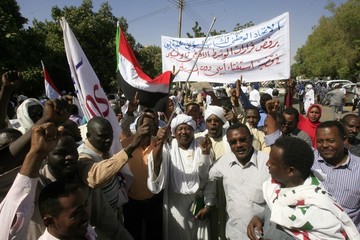Sudan’s Misseriya stage demonstrations against Mbeki’s Abyei proposal
November 28, 2012 (KHARTOUM) – Around 100 members of the Arab Misseriya tribe staged a demonstration in Khartoum on Wednesday to protest the proposal tabled by African Union (AU) mediator Thabo Mbeki on the disputed Abyei region which recieved the blessings of the Pan African body.
 Under the terms of the proposal the Dinka Ngok tribe, affiliated with South Sudan, would vote in the referendum to decide on the future of the area along with other permanent residents of Abyei. This would effectively leave out the nomadic Misseriya who travel south into Abyei a few months a year to graze cattle.
Under the terms of the proposal the Dinka Ngok tribe, affiliated with South Sudan, would vote in the referendum to decide on the future of the area along with other permanent residents of Abyei. This would effectively leave out the nomadic Misseriya who travel south into Abyei a few months a year to graze cattle.
The Sudanese government insists that the Misseriya should be allowed to participate. But unless a separate deal is reached with South Sudan by early December, the AU proposal will be binding to the two sides.
The popular commission of Abyei region which organized today’s demonstration handed a memo to the AU and the United Nations (UN) expressing their views and reiterating the rejection of Mbeki’s plan.
Mahdi Babu Nimir who heads the commission, said in a press conference that the proposal is a “Zionist, French, British and American” one that aims to allow South Sudan to annex Abyei.
He called that a betrayal of the Misseriya and the Dinka Ngok and a blow to peaceful co-existence in the region.
The Misseriya figure went on to say that the Abyei issue is used to remove Sudan from its African dimension and accused U.S. ambassador Susan Rice of working against his tribe in the United Nations Security Council (UNSC) calling her a “speckled snake”.
Nimir also had harsh words for the ruling National Congress Party (NCP) of president Omer Hassan al-Bashir saying they marginalized the Misseriya during the north-south peace talks in Naivasha which eventually led to the signing of the 2005 Comprehensive Peace Agreement (CPA).
He claimed that Sudan’s delegation had little knowledge about Misseriya’s tribal structure and also lambasted “influential” Dinka Ngok members in South Sudan government for “spreading lies” in international media on Abyei crisis.
“The issue of Abyei has been hijacked and if it was about courage we could take it [Abyei] by force but we respect the institutions,” Nimir said.
The referendum is close to two years past due as it was supposed to be held on January 2011 along with South Sudan referendum but disputes on voter eligibility delayed it.
In New York the Sudan UN ambassador Daffa-Alla Elhag Ali Osman described Abyei as a “sensitive issue” and warned that imposition of “any unilateral solution will not help reach a final peace in the area and might bring people back to square one which we would like to avoid”.
“The [United Nations] Security council here or any organ should not behave as a court of justice. This is a legal dispute on a territorial dispute. The two parties must be given time,” he told reporters after a briefing on South Sudan by head of UN peacekeeping operations Hervé Ladsous.
“So any kind of quick fix which will not take care of the interests of the two communities on the ground would not help the two states agree on a final suitable solution for Abyei,” Osman said.
The Sudanese diplomat emphasized that they should be given more time to seek alternative solutions
But South Sudan UN ambassador Francis Deng told UNSC meeting that his country welcomes the “endorsement of the UN Security Council of any decision made by the African Union with regards to Abyei or other outstanding issues, not as an imposition on the parties but rather as a demonstration of support for the region’s considered view of what the most appropriate way forward is the AU endorsement of Abyei plan”.
Deng expressed regret that Sudanese president did not take up South Sudan president invitation to Juba to continue discussion on the final status of Abyei.
In Khartoum, the visiting US special envoy to Sudan said that Washington is seeking to narrow gap between Khartoum and Juba on outstanding issues including Mbeki’s proposal on Abyei.
Sudanese troops withdrew from Abyei in May to end a year-long occupation that sent more than 100,000 people fleeing towards South Sudan. The area is now controlled by United Nations peacekeepers from Ethiopia.
(ST)
